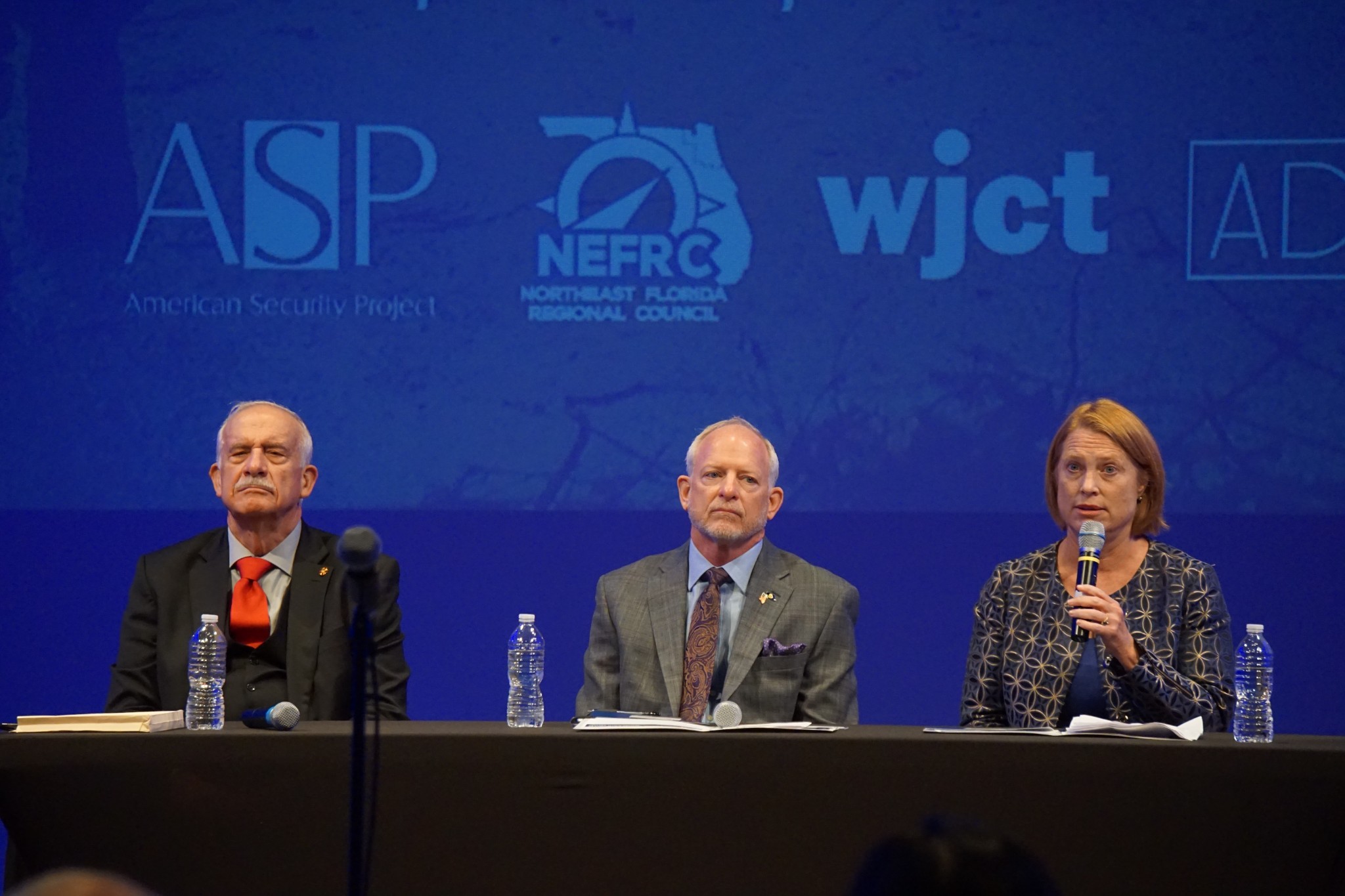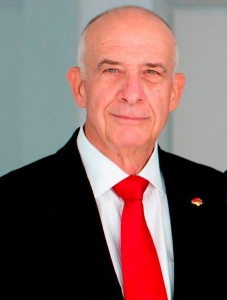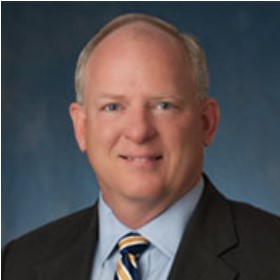
Event Recap: Climate Change and National Security in Northeastern Florida
Watch the full recording here:
On August 24, The American Security Project (ASP) and the Northeast Florida Regional Planning Council, in partnership with ADAPT, hosted a panel discussion in Jacksonville, FL with Lieutenant General John Castellaw USMC (Ret.) and City of Jacksonville Council Members Randy DeFoor and retired U.S. Navy Captain Aaron Bowman, on why combating climate change in the greater Jacksonville area is imperative for America’s national security.
As the home of two major Naval installations, a Coast Guard sector headquarters, a Marine Corps logistics facility, and a major national guard base, Jacksonville has an outsized impact on America’s national security. Rising sea levels, more frequent and powerful hurricanes, and increasing temperatures in Florida, however, all threaten training and readiness. Efforts by the City of Jacksonville and local bases are key, both for the local community and Americans who depend on forces stationed in Northeast Florida.
“Clearly Something Is Occurring.”
LtGen Castellaw opened the panel by speaking about recent climate change related events. He referenced the flooding in his home state of Tennessee, the rare occurrence of a tropical storm threatening New England, and Lake Mead’s historic water shortage. “What does climate security have to do with this?” He asked, “In the military we learned you have to be concerned with enemy capabilities, the terrain you are operating in, and the weather you’re going to deal with because climate and weather can impact the capabilities of the individual military member, your systems, and logistics.”
“The military has studied climate change and determined it is a threat multiplier.” Said Castellaw. He then detailed how, as a pilot, he had to be particularly aware of atmospheric conditions to fly safely. Changing conditions, like more days of extreme heat annually will limit when and where a pilot is able to fly. He went on to list climate issues he witnessed while in the Marines.
- Rapid expansion of the Sahara desert and sinking water levels in Lake Chad are driving migration in Africa, creating geopolitical conflicts.
- Russia is rebuilding large bases in the Northern parts of their country, and China is expressing interest in the Arctic, producing situations where conflict can arise. The U.S. is now relocating troops and equipment north.
- Domestically, we’ve seen billions of dollars of damage at bases like Camp Lejeune and Tyndall Air Force Base.
LtGen Castellaw finished his introduction, saying “Jacksonville bases Naval Station (NS) Mayport and Marine Corps Support Facility Blount Island deploy forces to places our nation needs them. When climate threats like hurricanes affect these bases, our nation’s ability to deploy and respond is diminished.”
Bowman later added an example from his years commanding Naval Station Mayport, stating that there were times he had to open the back gate to provide base access when the main access road would flood.
“When I was a senior Captain, we didn’t discuss global warming.”
Councilman Bowman opened his remarks by discussing his experience as a naval officer, and how that experience helped him understand how trade and water issues affect national security. Initially, climate change was absent in planning or threat considerations. “When I was a senior Captain, we didn’t discuss global warming.” said Bowman. While commanding NS Mayport from 2007 – 2010 he asked public works personnel what they were doing to address level rise, as he could see the sand dunes needed replenishing. “Nothing” was the response. Bowman believes 2008’s Tropical Storm Fay changed the southeast’s views on rising seas. The councilman referenced a past conversation about NS Mayport flooding, “Those that had been there for 30 years said they’ve never seen water like that in the basin.” This was the point he began planning for climate threats, like rising seas.
Hurricane Matthew was the first major storm he experienced in seven years on the city council. It was a major wind event that tore down large numbers of trees and roofs. Years later storm surge and downtown flooding from Hurricane Irma were the biggest issues. To create stability the council created a strategic plan on a 1/3/5 year basis and an adaptation action area work group, which brought in military and local expertise. Ordinance No. 2109-331-E came out of these efforts to further limit development in areas vulnerable to flooding without the completion of proper assessments.
Councilwoman DeFoor, the former chair of the resiliency committee, also discussed Hurricane Irma, “We learned its not just about sea level rise, it’s also about the river. We need to look at how the river impacts communities.” When asked if FEMA program changes would drive folks out of vulnerable areas, “yes” says DeFoor. “We have had to buy back property in low income areas and will likely have to continue as sea levels rise.” She was enthusiastic about the city’s new Chief Resilience Officer, Anne Coglianese. Her hiring is a big step forward and they expect she will be empowered to work across various departments to take the city in the right direction based on her past experience in New Orleans.
The Future of Resiliency in Jacksonville
With the Atlantic Ocean and the St. Johns River delta touching much of Jacksonville, Jacksonville has more coastline to be concerned about than any other U.S. city. So far the council has prioritized flooding and heat as the climate issues most directly affecting the city. The local power utility, JEA, is looking to mitigate climate change as well, by planning to have 30 percent of its fuel come from zero-carbon or carbon-neutral projects by 2030.
To help reach the city’s resilience needs and to find the funding to make the projects a reality, there are federal programs available. Please click here for a summary of those programs.
Fact Sheet: Climate Security Challenges in Northeastern Florida
In The News: LtGen Castellaw on jacksonville.com
Speaker Details:
Lieutenant General John Castellaw, USMC (Ret.)

John “Glad” Castellaw is co-founder and chief executive officer (CEO) of Farmspace Systems LLC., a provider of aerial data collection, management, and equipment.
During a 36-year career, he led Marines around the world ashore and afloat, flew over two dozen different aircraft, served on the UN staff during the Siege of Sarajevo, planned and executed humanitarian operations in Asia, Africa, and Europe, commanded the American forces instability and security operations in East Timor, and was the chief of staff for the U.S. Central Command during the wars in Iraq and Afghanistan. His final assignments were in the Pentagon where he oversaw Marine Aviation and the Marine Corps budget.
A recognized national security expert, he has testified before a Senate committee on food security and is affiliated with several Washington-based think tanks providing expertise on the impacts of climate, food, and energy insecurity. He frequently travels overseas recently visiting Cuba, Israel, Qatar, the Central African Republic, Rwanda, and Australia. He lives on and operates his family farm in Crockett County, Tennessee.
Randy DeFoor, Jacksonville District 14

Councilwoman DeFoor is Senior Vice President and National Agency Counsel for Fidelity National Financial, a fortune 500 company. She earned her bachelor’s degree from the University of the South, Sewanee and JD degree from Cumberland School of Law. Randy served as a commissioner of the Jacksonville Economic Development Commission from 2006-2012. She recently served as the chair of the Jacksonville International Airport Community Redevelopment Area. She served as a trustee on the boards of Episcopal School of Jacksonville for twelve years and Riverside Presbyterian day school for eight years.
Randy was appointed by Governor Scott to the District Board of Trustees for Florida State College at Jacksonville for four years where she formerly served as Chair. She also serves on the Women’s Board of Wolfson Children’s Hospital, the Cathedral Arts Project and the Innocence Project of Florida. Randy and her husband have six grown children and two grandchildren.
Aaron Bowman, Jacksonville District 3

Councilman Bowman is the Senior Vice President of Business Development for the JAXUSA Partnership where he leads the business recruitment and expansion efforts for the Northeast Florida Regional Economic Development team.
Aaron served 28 years in the United States Navy and retired as a Captain after serving as the Commanding Officer of Naval Station Mayport. He began his navy career following graduation from the United States Naval Academy and attended flight school and received his wings in September of 1985. During his early career in the navy, Aaron was an aircraft carrier pilot flying both the A-7 Corsair and F/A-18 Hornet. Following 15 years of flying, Aaron earned a Masters of Business Administration and was selected to the Aeronautical Engineering Duty Officer Corps (AEDO). As an AEDO, he was involved in the research and development, testing, and development of numerous advanced weapon systems. He is one of two AEDO’s ever selected to Command an Operational Naval Station and assumed Command of Naval Station Mayport in September 2007 until his retirement.
He is active in the community where he has served as Duval County Commissioner for the Florida Inland Navigation District, as a commissioner for the St Johns River Ferry Commission, an Advisory Board member for the Salvation Army, and on the Dean’s Leadership Council for the University of North Florida. As a member of the Jacksonville City Council, Aaron served as Council President for the 2018-2019 council year and currently serves as Chair of the Finance Committee and is a member of the Neighborhoods, Community Services, Public Health & Safety Committee, as well as the Tourist Development Council.
Aaron is married to his childhood sweetheart, Deborah. Their son Blaise attends the University of Florida where he studies Engineering.





